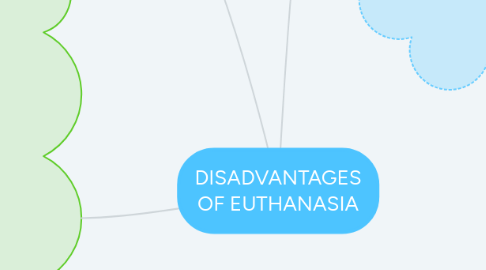
1. Social pressure
1.1. Patients who died from ingestion of lethal drugs did it because they no longer wanted to be a “burden” on their family members.
2. Medical Aspects
2.1. Disadvantage: Euthanasia medication doesn't always deliver on its promissed result
2.2. Disadvantage: Euthanasia avoids the benefits of palliative care
2.2.1. A central tenet of palliative care medicine is that there is never a situation in which nothing can be done
2.3. the possibility of error
2.3.1. Errors in diagnosis and prognosis can and do occur
2.3.2. Disadvantage: The prediction of a terminal diagnosis is rarely accurate
2.3.3. Disadvantage: Second medical opinions are note always necessary for euthanasia
2.3.4. The cost of such a mistake is a human life.
2.4. a diminished physician-patient relationship
2.4.1. The relationship between the terminally ill patient and the physician is asymmetric, with safety, information, and power on the side of the physician. If Euthanasia is a statutory option, the physician may feel obliged to list it as an option, and the patient may feel obliged to consider it. This creates the real possibility that the person with terminal illness may choose the option under duress. The cost of such a mistake is a human life.
2.4.2. The autonomy arguments for legalizing Euthanasia fall short in part because the harms to the patient, to medical professionalism, and to the physician-patient relationship outweigh the needs of those who seek ultimate control over their time of death.
2.5. and a slippery slope toward the practice of euthanasia
2.5.1. the Patient's fear, fatigue, worry, and pain can and do adversely affect decision making by terminally ill patients with cancer who are considered legally competent to choose Euthanasia.
2.5.2. Justifying Euthanasia for some opens the door to justifying euthanasia for many.
3. Ethical Aspects and Moral Regarding to Euthanasia
3.1. decreased physician professionalism
3.1.1. The physician’s professional role is to use his or her knowledge, insight, and healing skills to aid the patient, not to kill the patient
3.1.2. Providing Euthanasia requires much less expertise, it is one size fits all, and the toxicity is grade 5. Another example is pain relief. A medication administered to palliate symptoms that inadvertently causes death is ethical and is profoundly different from a prescription designed to bring about death.
3.1.3. Euthanasia is against the integrity of the profession because the doctor’s purpose is heal people and help them to live.
3.1.3.1. The International Code of Medical Ethics of the World Medical Association says that: “A physician shall always bear in mind the obligation to respect human life”.
3.1.3.2. The code of American Medical Association (AMA) says that: “Euthanasia is fundamentally incompatible with the physician's role as healer. The involvement of physicians in euthanasia heightens the significance of its ethical prohibition. The physician who performs euthanasia assumes unique responsibility for the act of ending the patient's life”.
3.2. RELIGION AND MORAL
3.2.1. It is forbidden, banned or sin in most of religion because only God should decide when we die

